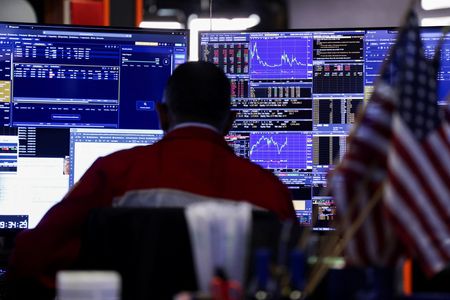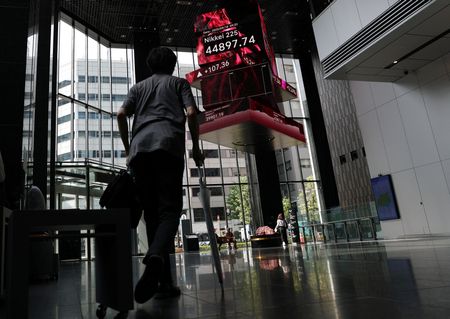By Alun John and Ankur Banerjee
SINGAPORE/LONDON (Reuters) -Global financial stocks slid on Friday as a rout in U.S. regional banking shares heightened concerns about credit quality and mounting risks in the sector.
The banking sector’s exposure in two recent U.S. auto bankruptcies has rekindled concerns about lending standards more than two years after Silicon Valley Bank’s failure, when high interest rates drove paper losses on its bonds and sparked a global bank stocks rout.
Investors are now trying to assess whether recent issues in U.S. credit markets will have a similar effect, as an overnight selloff on Wall Street rippled across Asia and Europe and shone a spotlight on the recent AI-led surge in broader stock markets that some fear could have created a bubble.
DEUTSCHE BANK AND BARCLAYS LEAD EUROPEAN LOSSES
“What we see in the banks selling off overnight in the U.S., Asia wakes up to it, Europe wakes up to it, and so it spreads,” said TD Securities head of global macro strategy James Rossiter.
European banks fell almost 3%, with Deutsche Bank and Barclays sliding around 6%, and Societe Generale down 4.6%, after financial firms in Asia, especially Japanese banks and insurers sank.
In pre-market U.S. trading, the SPDR S&P regional banking ETF was down 2.4%, a day after the benchmark tumbled 6%, its steepest one-day selloff in six months.
Shares of Zions Bancorp, at the heart of the investor scrutiny, slid 1.7%, with big banks down a similar amount.
U.S. stock futures fell and in a sign of the fears of contagion, big tech names fell more than banks, with Nvidia around 3% lower.
The latest selloff came after Zions said it would take a $50 million loss on two commercial and industrial loans from its California unit, while Western Alliance disclosed it had initiated a lawsuit alleging fraud by Cantor Group V, LLC. Attorneys for Cantor denied the allegations.
Such disclosures would not typically impact broader markets, but drew attention as they followed the collapse of two U.S. companies, FirstBrands and Tricolor.
Those failures rattled investors worried about risks in private credit, a booming but less regulated market where companies have borrowed heavily in the past few years.
Credit impairments in private debt have been rising and default rates have hit 5.5%, said Mark Dowding, chief investment officer at RBC BlueBay Asset Management, citing latest available data for the second quarter.
“At the same time, it has also been striking that where credit events have occurred, this has gone hand-in-hand with a weakening of covenants and investor protections, inferring larger losses on default than have historically been the case,” he added.
JPMorgan Chase CEO Jamie Dimon said earlier this week about credit markets: “When you see one cockroach, there are probably more, and so everyone should be forewarned.”
BROADER MARKET IMPACT
“Investors will have memories about how problems in regional banks in 2023 sparked a sharp decline in global bank stock prices and falls in broader global stock markets as well,” said Vasu Menon, managing director of investment strategy at OCBC Bank in Singapore.
Big U.S. banks have largely reported strong earnings in recent days, but with valuations across equity markets already high, investors are nervous.
European bank shares are up some 40% year-to-date, while world stocks have risen 16%, as investors flocked to companies that might benefit from the AI boom.
There has already been unease that the rally might have gone too far, with periodic sharp falls and gains for safe-haven assets.
Worries about an escalation in U.S.-Chinese trade tensions sparked selling in stocks late last week.
Investors are now fully pricing in an October U.S. rate cut, sending government bond yields lower, and the safe-haven Swiss franc has appreciated.
Gold meanwhile hit a fresh record high, set for its best week in over 17 years.
(Reporting by Ankur Banerjee in Singapore and Alun John in London. Additional reporting by Kevin Buckland in Tokyo Stella Qiu in Sydney and Dhara Ranasinghe in London and Medha Singh in Bengaluru. Editing by Mark Heinrich and Mark Potter)










